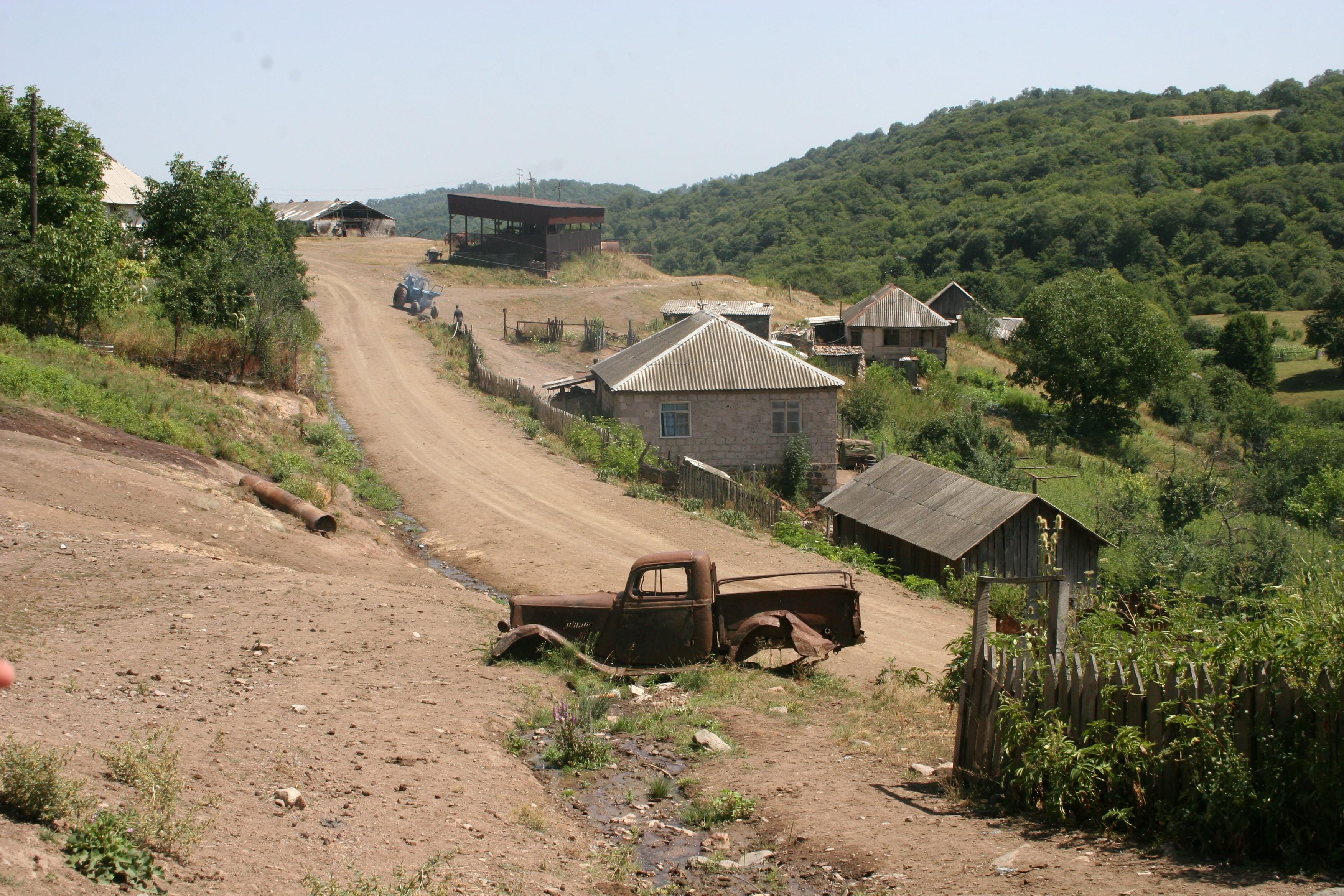
10,000 hectares in danger
ThevillageofJilizais right on the Georgian border. It is the only Armenian settlement in the area. The only way to reach the village is a bad 28-kilometer stretch of road through the forests between Alaverdi and Jiliza that takes two hours or more by car. The road is closed in the winter. Most people drive a Vilis (something like a big military jeep) or if the road is dry, a Niva. Twice a week a Russian-made Ural military truck, adapted for transporting people, goes to Alaverdi and back. Huge tree stumps by the side of the road are the only signs of civilization. People who have made a business out of cutting down trees business have forged paths into different parts of the forest-from a distance you can see the empty patches-but nobody catches the woodcutters. They take the wood away in two directions--to Georgia and Armenia. Only the sound of chainsaws breaks the deathly silence in the forest.
In Soviet times the road to Jiliza passed through the Azerbaijani village of Sadakhloin the Republic of Georgia. It has been impossible to use this road since 1988. The government of Armeniabuilt the Jiliza-Alaverdi road in 1990-1991. Although there has been sporadic work done since then, this dirt road becomes impassable when it rains.
There is no telephone communication in the village, except for the Georgian cell-phone that belongs to the village mayor. So they call people in Armenia from Armenia using a Georgian telephone network.
“There are only two hours of electricity a day in the village. We get it fromGeorgia. That’s where we got it in Soviet times, too,” says Mher Vardanyan, the village mayor.
“If Mher weren’t mayor, we wouldn’t even stay here two days, we would leave. He helps with everything. He is our hope, if someone is sick he gives us a car; even if we go to their house at three o’clock in the morning, his wife, the village nurse, comes with us without complaining. In the summer my grandchildren stay here. In the winter we are alone, the roads are closed, my grandchildren don’t come, there is no electricity, no telephone,” Gohar Matinyan tells us, busy with her farm animals.
A year ago, Mikael Basmajyan, Nadia Sarafyan and Frank Blejyan, members of the Greek Union of Friendship withArmeniaand Artsakh, came to Jiliza. They visited all the families, learned about their living conditions, and then bought a cow and a ton of hay for each of the seven neediest families. For a year, the Greek-Armenian organization has paid a stipend of five Euros a month to ten families in need. They have also paid 135,000 Drams (about $235) for enough textbooks for a year and provided $180 worth of windows panes and 25 chairs for the school, and bought a TV set for the frontier post in Jiliza.
“The Armenian Social Investment Fund (ASIF) is building a seven-kilometer water pipeline in Jiliza. The ASIF and the International Fund for the Development of Agriculture each gave $40,500 each for the $90,000 project. The village itself was supposed to contribute 10 percent of the cost of the project, but couldn’t afford to, and once again the Greek-Armenians stepped in with $9,000. “TheUnionis also willing to invest money if the government decides to build a road and electric power lines,” says Mayor Vardanyan. He hopes that the government will at last write those projects into the budget, as has been discussed at state and regional levels.
Nobody’s building any new houses in the village-people are more inclined to think about moving away. In the last four years three young families have left the village, one forGreece, two forRussia. “I am moving to Greece to make a living,” says Mkrtich Sargisyan, “If I work there half as much as I work and suffer here, it’ll be enough,” He has been invited by relatives who have been in Greece for a few years.
“And what about Jiliza?” I asked.
“Yeah, it’s my homeland, my country, but I can’t live here, what can I do? Young people break their backs working the land, but one year hail destroys everything, another year rain, this year we don’t have wheat. Any one who had the chance would leave the village.”
Mher Vardanyan, mayor since 1987, believes that one day the government will realize that Jiliza is important. “Here, it’s not just a question of whether these 75 families live well or not. If people move away, we’ll lose 10,000 hectares of Armenian territory. I am convinced that if we don’t have settlements, here it will be hard to hold on to this land. Jiliza is the only village in this part of the border that can keep these 10,000 hectares.”
 Videos
Videos Photos
Photos




Write a comment